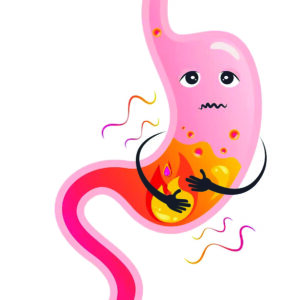Dr. Trishala Chopra is an alternative medicine specialist commanding a decade of success in managing Diabetes, Obesity, PCOD/PCOS, Metabolic Disorders, Gut-health and Sleep-disorders. As a Health Coach, Dr. Trishala empowers your body’s potential to heal itself through a balanced ‘Gut-Mind-Body’ approach to help you achieve your wellness goals. Heartiest Congratulations to Dr. Trishala Chopra for recently being felicitated with the ‘Outstanding Leadership Award’ by ‘Heath 2.0 Conference’, held in Dubai, which recognises and honours leading medical professionals across the world, for their pathbreaking contributions in the field of Health and Wellness. [To connect with Dr. Trishala, Call/Message: (+91) 9930831317 or Email ID: drtrishalachopra@gmail.com]
 Even as the monsoons roll in, providing relief from the summer heat, it brings along an increased risk of gastrointestinal (gut-related) illnesses – stomach bugs, stomach flu and food poisoning are common monsoon maladies. Understanding the differences, causes, and prevention strategies for these conditions is essential to staying healthy and enjoying the lovely rainy season to its fullest.
Even as the monsoons roll in, providing relief from the summer heat, it brings along an increased risk of gastrointestinal (gut-related) illnesses – stomach bugs, stomach flu and food poisoning are common monsoon maladies. Understanding the differences, causes, and prevention strategies for these conditions is essential to staying healthy and enjoying the lovely rainy season to its fullest.
What’s A ‘Stomach Bug’?
Also known as gastroenteritis, a stomach bug refers to the inflammation of the stomach and intestines, caused by a viral or bacterial infection. The risk of contracting a stomach bug increases during the monsoons due to factors like contaminated water, improper food handling (ordering food from various delivery platforms), and poor hygiene practices (while cooking and handling). The pathogens responsible for stomach bugs include Norovirus, Rotavirus, and certain bacteria like Salmonella and Escherichia coli (E. coli).
Symptoms Of A Stomach Bug:
These could include nausea, vomiting, diarrhoea, abdominal cramps, and sometimes fever (not very common). It can be highly contagious and spread through close contact with infected individuals or by consuming contaminated food or water. Contaminated water sources, such as untreated or poorly maintained water supplies, pose a significant risk during this season. Inadequate sanitation and improper hand hygiene also contributes to the spread of stomach bugs.
Stomach Flu – Understanding Norovirus:
Though the term ‘Stomach Flu’ is often used interchangeably with ‘Stomach Bug’, it specifically refers to gastroenteritis caused by Norovirus – a highly contagious virus which spreads quickly in crowded places like schools, offices and other gatherings. Norovirus is known for causing outbreaks of gastroenteritis in public-intensive settings.
Symptoms Of Stomach Flu:
Symptoms include nausea, vomiting, diarrhoea, stomach cramps, and low-grade fever, unlike stomach bugs. Noroviruses can survive on surfaces for extended periods, making proper hygiene practices, such as regular handwashing, critical for prevention. It’s important to sanitize surfaces/ objects that may have come in contact with the virus.
Food Poisoning:
Food poisoning occurs due to consumption of contaminated food or beverages with bacteria, viruses, parasites, or toxins. During monsoons, factors like improper food storage, inadequate cooking of vegetables, and contaminated water sources increase the risk of food poisoning. Common pathogens responsible for food poisoning include Salmonella, Campylobacter, Staphylococcus aureus, and certain strains of E. coli.
Symptoms of Food Poisoning:
Symptoms typically appear within a few hours to several days after consuming contaminated food and may include nausea, vomiting, diarrhoea, stomach cramps, fever, and headache (unlike stomach bug and flu, where fever and headaches are not common). Severe cases may require medical attention, especially in vulnerable populations like children, the elderly, or individuals with compromised immune systems.
How Can We Prevent These Monsoon Maladies From Happening To Us?
Practice Good Hygiene: Wash your hands thoroughly with soap and water before handling food, after using the restroom, and after contact with potentially contaminated surfaces. Proper handwashing is one of the most effective ways to prevent the spread of gastrointestinal illnesses.
Tip: When ordering in food, ensure to remove the outer packaging immediately and wash your hands thoroughly using soap water (not sanitizer) before serving/eating.
Safe Food Handling: Thoroughly wash and cook all fruits, vegetables and meats. Avoid consuming raw or undercooked foods. Ensure that food is stored at appropriate temperatures. Cross-contamination should be avoided by using separate cutting boards and utensils for raw and cooked foods, as also meats and vegetables.
Tip: Avoid ordering food that contains raw veggies, salads and meats from outside during monsoons.
Drink Safe Water: Consume filtered or boiled water to minimize the risk of waterborne illnesses. Avoid consuming ice made from uncertain water sources or order iced-based drinks. When dining out, opt for bottled water or drinks prepared with boiled or filtered water.
Practice Caution With Street Food: While enjoying street food during the monsoons can be tempting, be selective about where you eat. Choose vendors who maintain good hygiene practices and cook food thoroughly. Avoid foods that have been sitting out for long periods or prepared in unclean conditions.
Maintain Clean Surroundings: Keep your living spaces, utensils, and food preparation areas clean and dry to minimize the risk of contamination. Ensure that your drinking water source is clean and protected from potential contamination.
Stay Hydrated: Drink plenty of safe fluids to stay hydrated, especially during the monsoon season when humidity is high and the risk of dehydration is increased. Hydration helps support your overall health and immune system function.
Add Probiotics To Your Routine: Kombucha, Kimchi, Sauerkraut and Probiotic supplements work as an immunity booster, so add these to your diets.
Seek Medical Attention: If you experience persistent or severe symptoms, consult a healthcare professional promptly. Timely medical intervention can prevent complications and aid in a speedy recovery. Certain cases of food poisoning may require specific treatments or medications.
While indulging in the delights of monsoon, do not forget to prioritize your health and take necessary precautions so that you can enjoy this glorious season to your heart’s and your stomach’s content!
- Mango Marvels: Conquer The Heat, Embrace The Sweet! - 27 April2024
- Power Of Colostrum: Tackle Inflammation, Nourish Your Gut! - 23 March2024
- Unlocking The Secret To Strong Bones: A Blueprint For Lifelong Bone Health - 16 March2024
